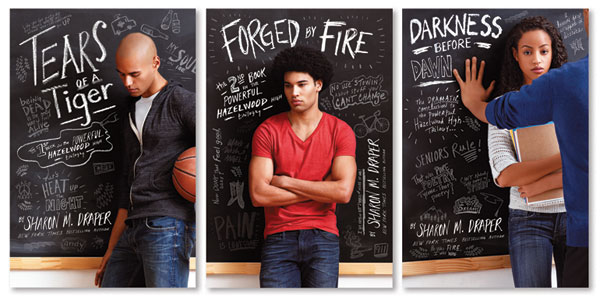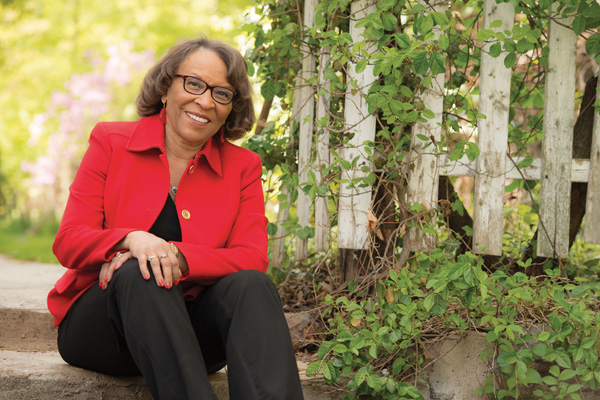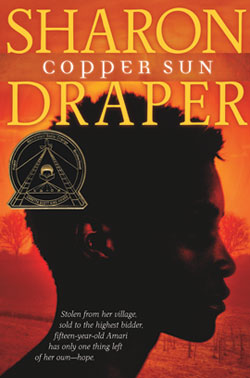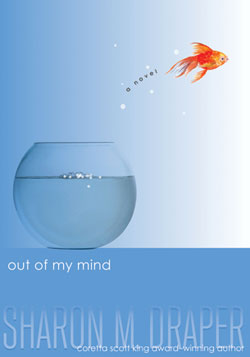Tales Out of School: An Interview with 2015 Margaret A. Edwards Award winner Sharon Draper

Photos by Todd Joyce
Sharon Draper is no stranger to winning accolades for her work. When she began her writing career, she was a highly esteemed professional educator, having reached the pinnacle by being named National Teacher of the Year. Her first novel, Tears of a Tiger, published in 1994, received the Coretta Scott King/John Steptoe Award for New Talent, and its sequel, Forged by Fire, earned the 1998 Coretta Scott King (CSK) Author Award. Battle of Jericho was a CSK Honor Book, and her first historical novel, Copper Sun, also won the 2007 CSK Author Award. Her 2010 middle grade novel, Out of My Mind, spent many weeks on the New York Times Best Sellers list and won multiple state reading awards. Now, Draper is the recipient of the 2015 Margaret A. Edwards Award, which recognizes a “significant and lasting contribution to young adult literature.” This annual award is sponsored by SLJ and is administered by the Young Adult Library Services Association (YALSA), a division of the American Library Association (ALA).
From the beginning, Draper focused her novels on teens whose stories are seldom told. While diversity is a current topic of discussion in the world of books for children and young adults, this author has long been placing well-rounded teens of color at the center of her narratives. Our telephone conversation, several weeks after the award announcement, demonstrates her connection to the young people who have been at the center of both her teaching and writing careers.
First, let me congratulate you for this incredible achievement.Thank you very much. I am just tickled pink.
What did you think when you heard you were selected as this year’s Margaret Edwards Winner for Lifetime Achievement?When the call came, I was in the airport, leaving the conference (ALA Midwinter) early. It was thrilling to say the least, but I couldn’t jump up and down and scream because I was at an airport, and I had to act like I had some kind of decorum.
I remember hearing about your first published story. Could you describe how that happened?I was teaching eighth, ninth, 10th grade, somewhere in there. I had a student who didn’t like to write, who grumbled at me from the back of the room, “Why don’t you write something sometime? You’re always making us write.” He gave me a crumpled-up copy of Ebony Magazine’s short story contest announcement, something they did for years. I had no intention of doing what the young man asked me to do, because he wasn’t the best student, but on the way home from school that day, I saw a woman verbally abusing a three-year-old in a grocery cart, and it really bothered me. When I got home, I wrote the words down because they were just so upsetting to me. I couldn’t help the child, and the woman left the store, but I couldn’t forget what I heard. I made a story to go with that line. I don’t know what happened to the little boy after that.
 You became a voice for the voiceless.
You became a voice for the voiceless. Yes. That story became Chapter 1 of Forged by Fire, but this was before I wrote Tears of a Tiger.
It is incredible that something that happened in passing led you to write.That was the event that started everything. And of course, when those things happen, you’re not aware that it’s an important event in your life.
The catalyst for your writing was a classroom challenge. But you’ve received so much recognition as an educator. How did that influence your career as a writer?I was National Teacher of the Year in 1997. Tears of a Tiger had come out in 1994, and Forged by Fire came out in 1998. It came out during the year that I was Teacher of the Year. I had written the first book, but I was still teaching. I always tell young writers, do not quit your day job [laughs]. Being Teacher of the Year let me see the rest of the country, the rest of the world. It let me see outstanding teachers everywhere, and it expanded my vision of what teaching and learning are all about, and the relationship between teachers and students. I think I have a teacher in almost every book.
What kind of reader were you when you were a teen?I have always been an avid reader, and I didn’t care what the subject was. It had to be well written. I couldn’t read a badly written book, although I didn’t even know what that meant at the time.
It sounds like those are the kinds of stories you were determined to write yourself.Yes, but I had no idea I was going to do that. I wish I had started earlier.
All of the books in the “Hazelwood Trilogy” were cited by the Edwards committee, and I know they are still popular in my library. Why do you think they resonate with so many teens?It is amazing to me that those three books are still being used in schools all over the country. Tears of a Tiger just celebrated its 21st anniversary. I get letters from young people that say things like “I used to hate reading, but your books let me know that reading can be cool” and “The way you described the characters, they could be my friends and I feel like they are my friends when I get to the end of the book.” Those are the kinds of comments I get from young people who weren’t even born when the book first came out.
 The teens in the series create a sense of community in their peer group. Was that something you wanted to acknowledge about young people? We tend to think of peer pressure as a negative. But there’s also the flip side, which is that it can also be supportive.
The teens in the series create a sense of community in their peer group. Was that something you wanted to acknowledge about young people? We tend to think of peer pressure as a negative. But there’s also the flip side, which is that it can also be supportive. After the fact, you tend to say, “Oh, yes, that’s what I planned” all along. I’m not sure if I consciously said when I was writing that I want to make this peer group strong and positive. What I set out to do was to have the young people depend on themselves and not on parents. Adults are pivotal in helping them over the larger humps they could not get over by themselves. But the kids work together to solve many of their problems.
The theme of resiliency is prominent in your books. In Forged by Fire, Gerald’s protectiveness toward his mother and sister is a strong feature in the story, and it’s not a trait usually explored in the lives of young urban males.Many young people I have met are the strengths of their family, and they are the ones who look out for their mothers and their siblings. I wanted to have a strong male character, a kid who could get through adversity and come out on the other side a little bit stronger and wiser and be in contrast to Andy, who doesn’t make it.
My favorite of all of your books is The Battle of Jericho. I like Jericho’s artistic bent and the unexpected twists in the story. In this novel, what looks like a community is something very different, and probably a little sinister. How did you decide to do that?There’s quite a bit written about hazing in colleges but very little about what goes on in high schools, and I think kids are more subject to peer pressure in high school than they are in college. So I created Jericho as a kid who doesn’t want to but who goes along with the crowd because it’s so much easier to do than to stand up and say, “No, this is wrong.” And also, the adults were kind of clueless as to what was going on with the kids, as is often the case.
We then pick up the story in November Blues. The trauma of loss is such an important part of that book. Do you think young people process loss differently than others?I think they feel it stronger and they believe nobody has ever felt like this before.
But you could see in November Blues, the young people dealing with loss in different ways.That’s right. Jericho couldn’t express himself through his music because it hurt so badly. He joins the football team so he could hit and run, and feel pain, and suffer because he needed to get beat up, literally.
 You were strongly identified with realistic teen fiction, and then you threw your readers a curveball with a historical novel, Copper Sun. What made you decide to go in such a different direction?
You were strongly identified with realistic teen fiction, and then you threw your readers a curveball with a historical novel, Copper Sun. What made you decide to go in such a different direction?
I had been working on Copper Sun for several years. It started the first time I went to Africa and I was unexpectedly stunned by its beauty and power. I went back to Ghana in a volunteer program, where I worked in the community. One of the most powerful gifts was a trip to Cape Coast Castle and Elmina Castle, two places where they kept the slaves before they were put on the ships. You feel the essence of their spirits as you go through what’s called “the door of no return.” You have to crawl on your hands and knees. It was something very deeply spiritual that called me to write that book. And I knew I couldn’t write about every slave that ever went through. I could only focus on one. Once I started working on the book, it took a good eight to 10 years to finish. I went back to Africa two or three more times and did voluminous amounts of research—way more than I could ever include in a book. But I had to do that in order to get to the essence of it. Like my other characters, Amari’s 15, she’s in love, and she’s had to go through awful difficulties in order to reach maturity.
Has your writing process changed from the time you started and you were new to the game until now, when you’re more experienced?[Laughs] I think I’m better at it, but it’s still a struggle. Going from nothing to completion is a hard task, and it’s like climbing a mountain. Even if you have climbed that mountain before, you still have to go through the struggle of getting to the top, and just because you know how doesn’t mean it’s any easier.
Do you feel more pressure now that readers and reviewers have expectations?It does increase the pressure. For example, I had a great deal of difficulty writing Stella by Starlight because it followed Out of My Mind, which was very successful. It’s been translated into 10 different languages. It was on the New York Times Best Sellers list for a year and a half. How do you write a book after that?
I am glad you brought up Out of My Mind because even though it’s not YA, but middle grade, we should discuss it. It was such a departure, although Melody’s wish to communicate is the same thing that your teen characters desire. Could you speak about that book and what it has meant?The book has been blessed, and the book is a blessing to many people. They thank me for giving a voice to the people who don’t have voices, not just for those who can’t talk. I have received letters from people with different kinds of disabilities [saying], “Thank you for letting people know my child has a brain, that my child can think and is a person.” It’s not a book about disabilities. It’s a book about being heard and being understood. I’ve received letters from young people that say, “You changed the way I think about myself because I never noticed that other side of my school community and now I do.”
 It’s been recently reported that Out of My Mind is being made into a movie. How do you feel about that?
It’s been recently reported that Out of My Mind is being made into a movie. How do you feel about that? I am thrilled that someone is looking at my novel as a film possibility. I have not bought the gown for the Academy Awards yet, but I am tentatively and prayerfully hopeful that the possibility of a movie becomes a reality.
You’ve been writing about diverse teens for a long time. What are your thoughts on the recent national conversations about diversity?First of all, if we’re going to take seriously the issue of diverse books, we need diverse authors. We need to encourage writers from every culture and those who are willing to broaden the base of what they are writing. We need to encourage publishers to question assumptions about the dominant reading culture. Publishers need to think about the covers of their books and the universality of the message inside of the book. Let me go back to when I was a little girl. I might have been in sixth grade before I finally found a book that had a little brown girl on the cover. But that did not stop me from reading. I was an avid reader, and I learned a lot about other cultures and other people in other countries, because I was willing to go beyond the cover and discover the universality of a story about, say, girls from India. In today’s world, kids look at the covers of books that might be interesting to a wide variety of young people but it seems the book is for somebody else. If a book has universal themes about love or fear or hope or death, make the cover attractive to all readers. If the book is good enough so that I care about the characters, it doesn’t matter what race they are because I’m interested in what they are facing and learning. Many books have wonderfully universal themes, but they are marketed to certain segments of the population.
You’re absolutely right. As human beings, we want good stories and we have to find ways to connect with that part of all of us. You have found a way to connect with kids who never thought their stories were worth reading. Is there anything else that you’d like to say as we conclude?Well, again, I’m extremely thankful and honored to be selected for this award. They told me I had to write a speech. I’m terrified because I don’t write speeches. But I actually worked on it last week, so I’m getting there. I’m just really thrilled. Because I am a library and reader kid, and because that reader kid became a writer, it means so much to be honored by the folks who mentored me all through school.
Deborah Taylor is coordinator of school and student services for the Enoch Pratt Free Library in Baltimore. She is the recipient of the 2015 Coretta Scott King-Virginia Hamilton Practitioner Award for Lifetime Achievement.
RELATED
The job outlook in 2030: Librarians will be in demand
The job outlook in 2030: Librarians will be in demand
ALREADY A SUBSCRIBER? LOG IN
We are currently offering this content for free. Sign up now to activate your personal profile, where you can save articles for future viewing






Add Comment :-
Comment Policy:
Comment should not be empty !!!
Linda
Last year Sharon Draper was our 1book author and it was fantastic through a private gift fund we gave away 12,000 copies of Out of My MindPosted : Jun 08, 2015 10:17
Margaret Horton
While an educator in Cincinnati, I found great pleasure in knowing and interacting with Sharon Draper. I shared her books and series in every phase of my career-teacher, administrator, community youth leader, and especially as a grandmother! My oldest granddaughter prizes her autographed copies of Sharon's books that we have read together. How proud she was when her class in Loudon County Virginia read " Out of My Mind" together. Thank you for this article, which further highlights the riveting impact of Sharon's writings on students and other readers to an unfathomable degree. I am one of her most avid fans, and I am already, prayerfully, planning a theater party to the premiere of "Out of Mind" in Atlanta!Posted : Jun 08, 2015 08:27
Karen Brantley
Sharon is a great writer and my best friend we share a common bond personally and I'm education. I love all her books even though I'm an adult. I'm very proud of all her accomplishments and wish her the best in all her endeavors . I you haven't read any of her books I encourage you to do so you will not be disappointed. My son became a teacher coming up on her books was one of the main factors. Once again ' Congratulations ' my dear friend.Posted : Jun 08, 2015 06:57
J. Hardison Sims
Sharon Draper started publishing when I started teaching and going to library school. Her books are always so easy to get students to read and continue reading. I wish there were more authors who had such a strong connection and ability to capture the universal themes for teens.Posted : Jun 07, 2015 06:48
Lynn Ferrari
One of my very favorite authors! As a LMS, I am always encouraging readers to try her work! I plan on making a display highlighting her books in the coming school year. Congratulations on this much deserved recognition!Posted : Jun 04, 2015 12:34